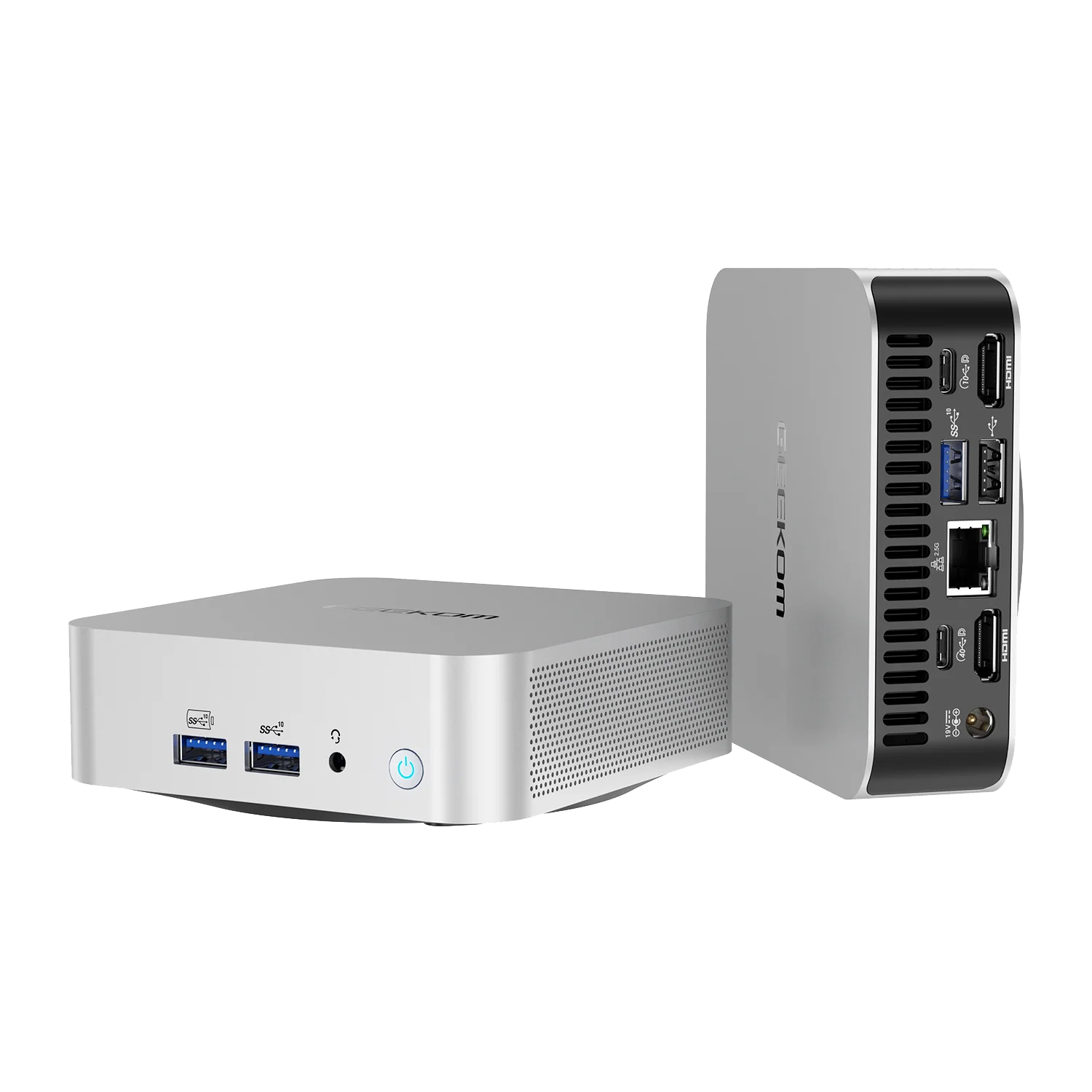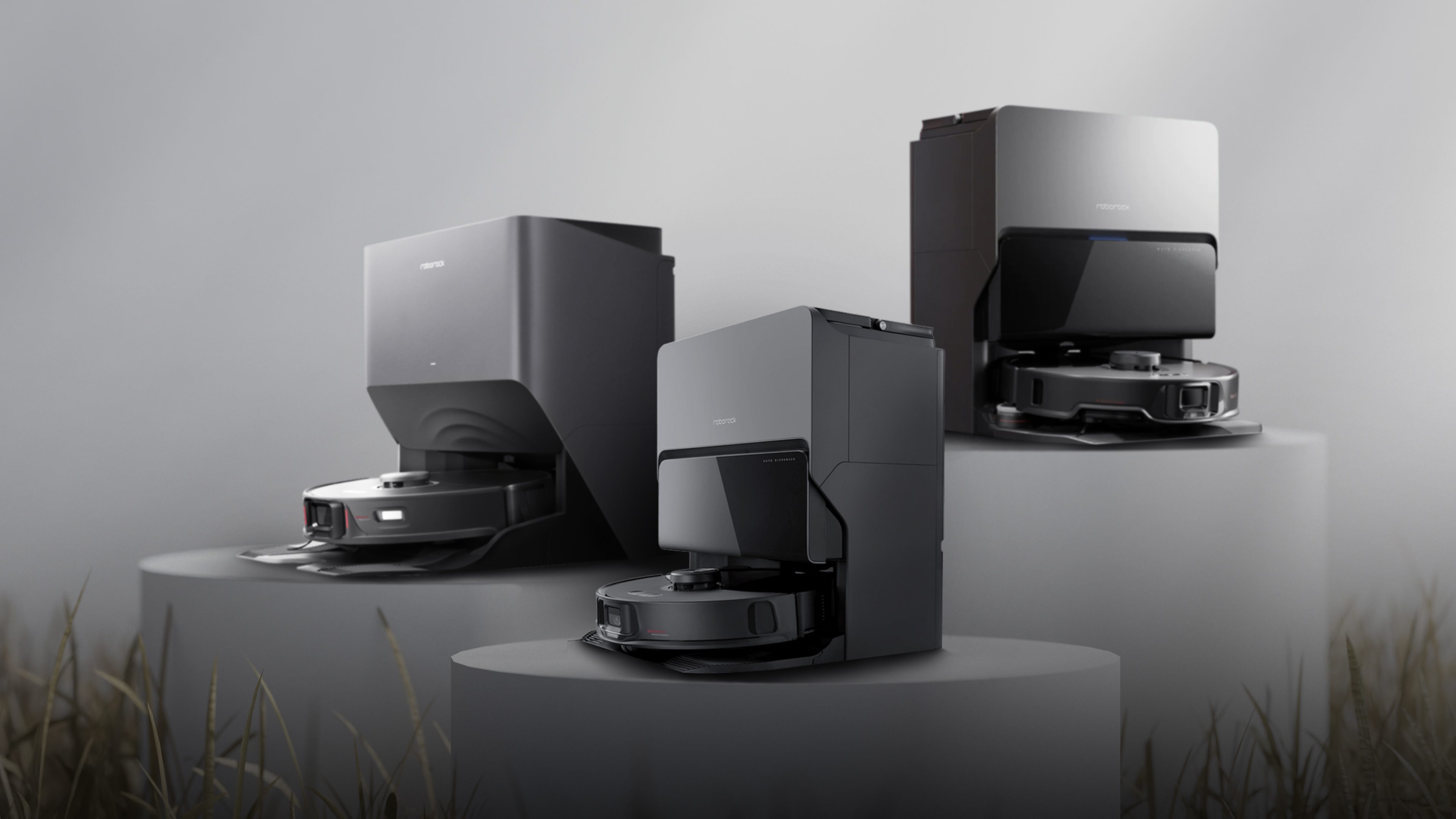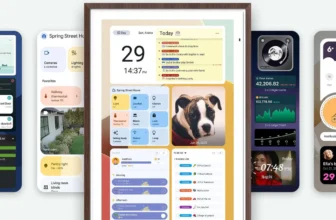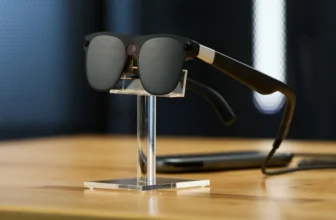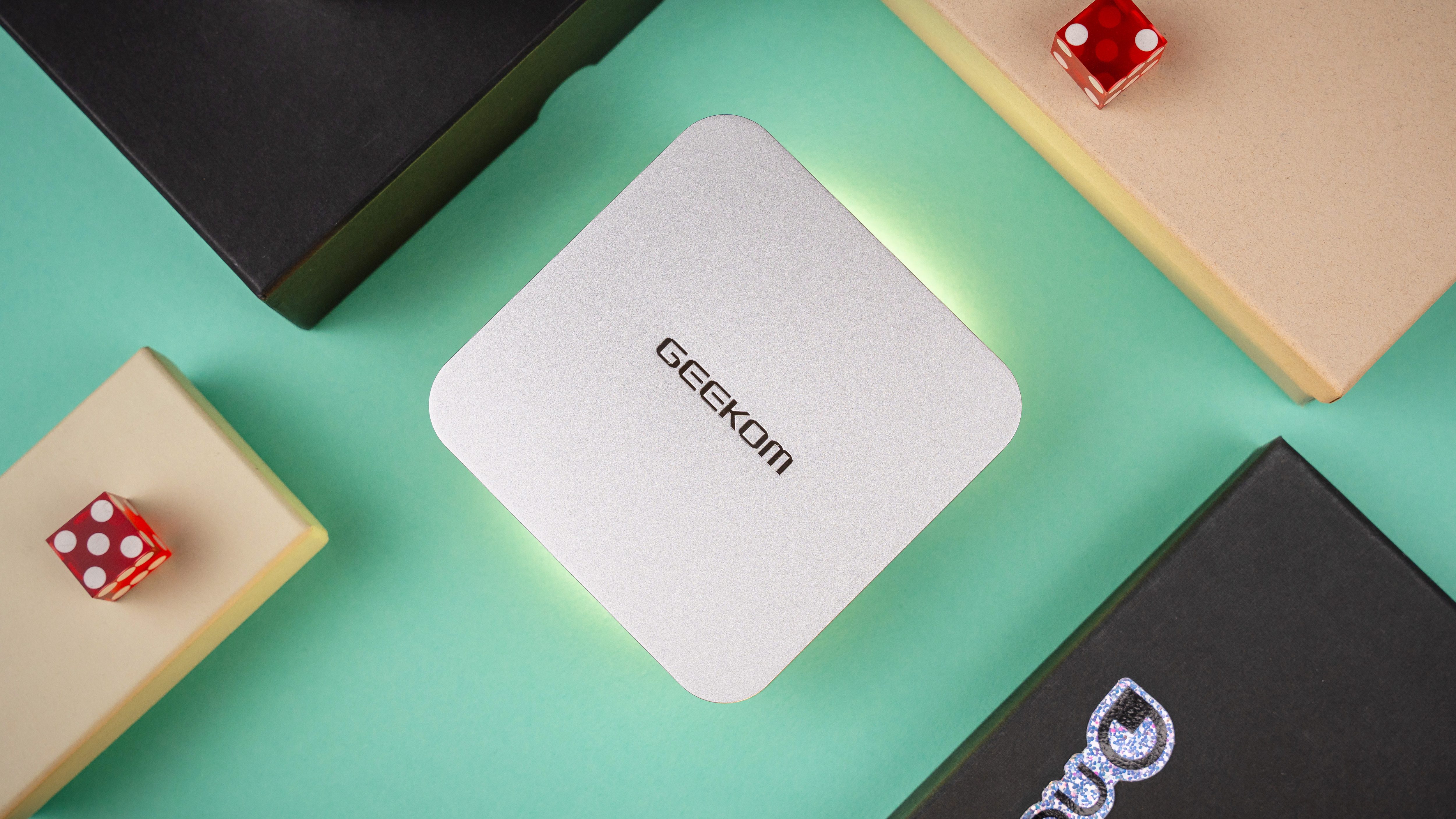
With the new Geekom A7, the mini PC manufacturer has taken a few pages from Apple’s Mac Mini book. While the visual similarities are obvious as soon as you unbox it, the A7 conceals different hardware. Instead of an M2 processor, there is AMD architecture and for less than $850, you get a massive amount of memory. However, can the A7 compete with Apple’s model? The answer might leave you bewildered…
Good
- Performance at Mac mini level
- Nice, compact case
- High build quality
- Low power consumption
Bad
- Only with HDMI 2.0
- No second SSD upgradeable
- Limited processor performance
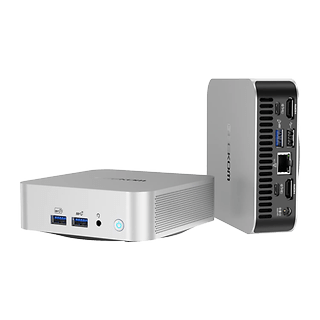
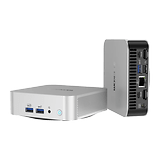
Geekom A7: All deals
The The Geekom A7 in a nutshell
The Geekom A7 surprised us in this review with its attractive design, excellent workmanship, and truly outstanding performance. With a maximum MSRP of $849 for the most powerful configuration, it offers a similar level of performance to the Apple Mac Mini, which costs almost $2,600 for the same memory configuration.
The only disadvantages were the lack of HDMI 2.1 connectivity and limited expandability options. If you are looking for alternatives, you can find them in nextpit’s list of the best Mini PCs with Windows 11.
This article was created in collaboration with Geekom. This did not influence the content or our editorial opinion.
Design & build quality
The new A7 comes in a design that Geekom has never explored before. Apart from its close resemblance to Apple’s Mac Mini, this is also a minor milestone. For the very first time, Geekom uses aluminum as the material of choice for the chassis. This and the barely visible gaps, give the Mini PC a much higher quality look. The variety of connections is also excellent with the only disadvantage compared to other models being the expandability.
Pros:
- Very high-quality aluminum chassis.
- Modern connections include USB 4.
- Infrared transmitter (for use as a media center).
Cons:
- No USB-C port in front.
- Only HDMI 2.0 connectivity.
- No Kensington lock or other security options.
Until now, Geekom has always wrapped its mini PCs in a plastic chassis with a robust metal inner frame. With the A7, the manufacturer opted for a magnesium chassis that is milled according to really high standards. With dimensions measuring 11 x 11 x 3.7 cm, the Mini PC is also extremely compact. Our review unit showed barely visible gaps where the chassis merges with the plastic. These transitions can be found on the underside and the rear, which are strongly reminiscent of the Apple Mac Mini’s design.
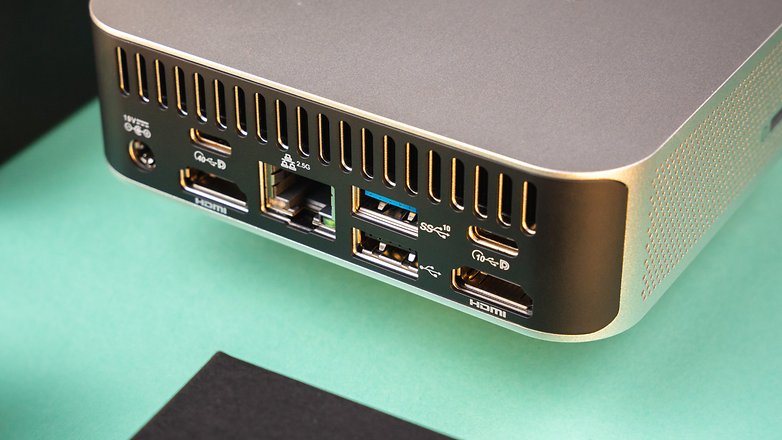
Unlike the smallest Mac from Apple, however, the underside of the Geekom A7 can be unscrewed. Geekom elegantly hid the screws under rubber feet, which can be loosened by using a little force. Once unscrewed, we find two DDR5 RAM modules and an M.2 2280 SSD that can be upgraded. While you can expand the RAM to 64 GB if required, the SSD memory is already configured to the maximum with 2 TB on PCIe Gen 4. Unfortunately, there is no slot for a secondary storage device.
While the expandability was rather limited, the Geekom A7 shone in terms of connectivity. The following connections are available:
- Front
- 1x USB 3.2 Gen 2 type A with power delivery
- 1x USB 3.2 Gen 2 type A without power delivery
- 1 x 3.5mm headphone jack
- Power button
- 1 x CIR
- Left side
- Right side
- Rear
- 1 x USB 2.0 type A
- 1 x USB 3.2 Gen 2 type A
- 1 x USB 3.2 Gen 2 type C
- 1 x USB 4 type C
- 1 x RJ45 Ethernet port
- 2 x HDMI 2.0 connection
- 1 x DC socket
The fact that there is no USB-C port in front is a minor disadvantage in my opinion. This means you always have to connect smartphones or USB-C peripherals from the back. As there are only two such ports, we recommend using a USB-C hub. What I don’t quite understand about the A7 is the use of HDMI 2.0 instead of HDMI 2.1 because, as we will see later, the Geekom A7 would certainly be powerful enough to support 8K displays at 60 frames per second or 4K content with 120 Hz. Hence, you are limited to a maximum of 4K at 60 Hz.
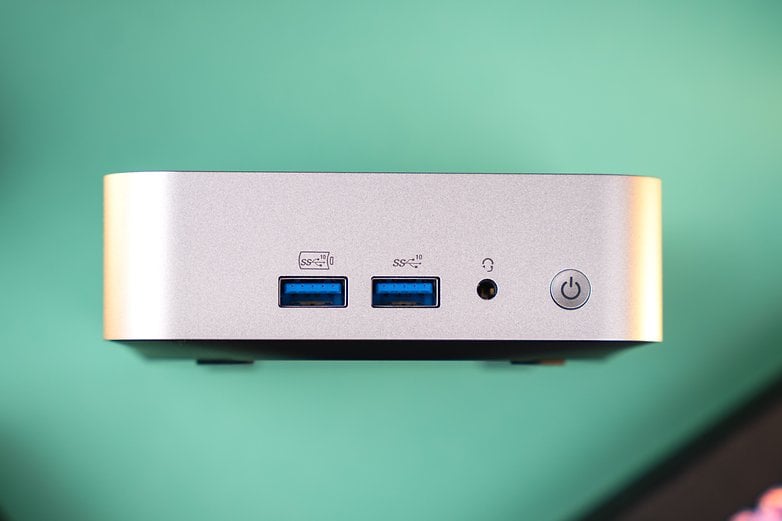
Another exciting feature is the installation of a CIR module. The “Consumer Infrared Communications” standard allows the use of infrared remote controls. This makes it very practical when used as a media center. Admittedly, using a mini PC that costs $850 as a media player would be a bit of an overkill. However, the fact that Geekom is now paying attention to this standard could be really exciting for future, more affordable Mini PCs.
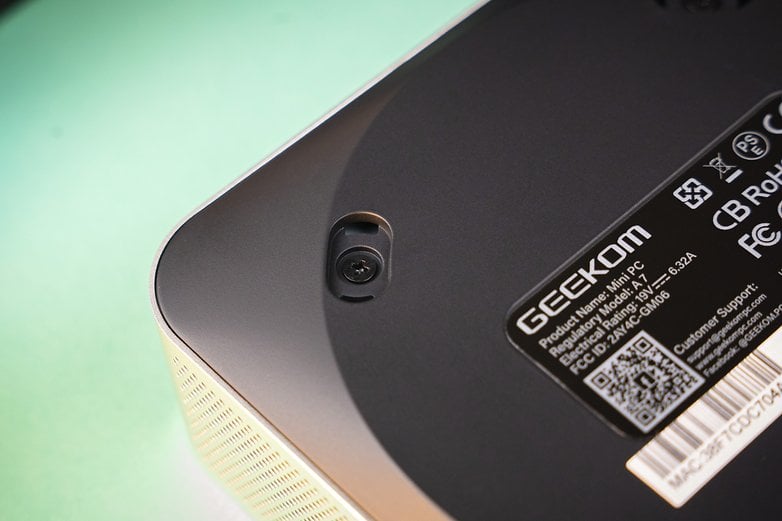
Overall, the A7 offers the most modern and high-quality design among Geekom’s Mini PCs. The build quality has reached new heights with its minimal gaps and matte aluminum chassis. While connectivity options could be better, it is certainly not a deal breaker.
Software
Geekom delivered the A7 with the Windows 11 Pro out of the box. This makes the mini PC suitable for multimedia use as well as for office tasks and gaming. The installed operating system is an OEM version, which means you cannot transfer the license to other hardware in the future. However, you can install Linux or other operating systems for a dual-boot solution.
Pros:
- Windows 11 Pro pre-installed.
- Dual booting is possible.
Cons:
- OEM version of Windows does not allow license transfer.
Anyone looking for a mini PC will certainly be familiar with Windows. As usual, Geekom uses Windows 11 Pro in this model. If you are interested, you can install additional operating systems in a dual-booting configuration. Thanks to the 2 TB storage space, it is more than adequate to fulfill your geeky fantasies.
If you’re coming from MacOS: Windows 11 is a very comprehensive operating system, which I think has become even more intuitive recently. Thanks to pre-installed drivers and basic applications, you can start using it right away after setup. Thanks to the Microsoft Store, the first programs find their way onto the mini PC quickly.
It is understandable for Geekom to install an OEM version of Windows 11. However, this eliminates the possibility of using the license on a different device. This means there is no way to migrate to a different computer in the future if you so desire.
Performance & Hardware
The Geekom A7 uses the latest generation Ryzen 9 processor, which means you will work with AMD architecture. Geekom provides the SoC with a hefty 32 GB DDR5 RAM and 2 TB of SSD storage in the maximum configuration. WiFi 6E is available for your wireless needs, while benchmark results are extremely interesting, especially when you compare them with Apple’s alternative.
Pros:
- Fantastic benchmark results.
- New cooling system is significantly quieter than Geekom alternatives.
- Fast SSD speeds.
Cons:
- Processor performance cannot be maximized.
- No additional SSD slot.
In my previous Geekom PC reviews, models with AMD architecture delivered a little more performance than their Intel brethren. I was therefore really curious to see how the Geekom A7 would perform in benchmark results. This is due to the manufacturer relying on a relatively up-to-date, high-end notebook processor with the beautiful moniker, “Ryzen 9 7940HS”. The SoC has a total of eight cores and runs with a maximum TPD of 54 W. As with the other models, we hit a brick wall here when used in a mini PC, snce Geekom limits the TDP (Thermal Design Power) to just 45 W.
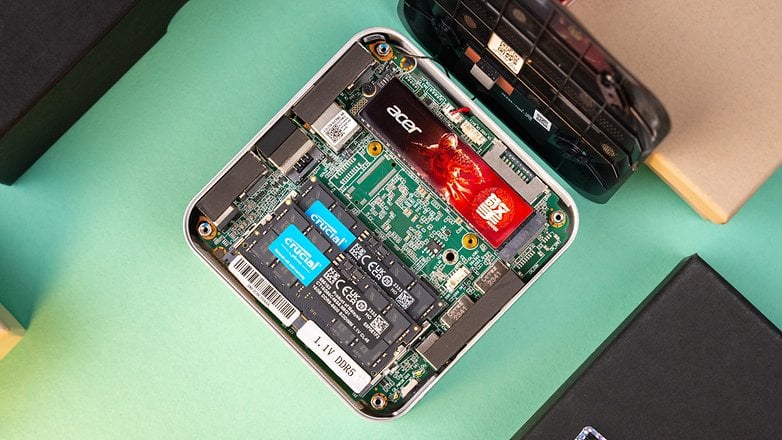
The Ryzen 7940 HS chipset also includes a twelve-core graphics card known as the Radeon 780M and an AI accelerator for improved multitasking. Together with 32 GB of RAM, which the CPU and GPU share between themselves, this results in a really fast working speed for office tasks. Programs launched without delay, and the hardware even managed to multitask with Chrome, Photoshop, and Lightroom effortlessly.
While multitasking and office applications are generally not a problem with notebook processors such as the Ryzen 9 7940HS, computer games and video editing programs do tend to pose a challenge for such SoCs. This is because the graphical performance of an integrated graphics card is usually limited compared to dedicated GPUs with their own graphics memory. However, the problems were less noticeable in this review. The Geekom A7 was even able to run Counter Strike 2 smoothly on a 4K display at the highest graphics settings. Forza Horizon 4 ran on Ultra settings on Full HD at 30 fps, and Pacific Drive could also be played on high graphics settings.
The high performance level was once again confirmed when we looked at the benchmark results of the Geekom A7. In the following table, I included the results of our MacBook Pro with M3 Max (review) and M3 Pro alongside other Geekom models:
Benchmark table
| test | Geekom A7 | MacBook Pro M3 Pro | MacBook Pro M3 Max | Geekom Mini IT 12 | Geekom Mini IT 13 | Geekom A5 | Geekom AS 6 | Geekom Mini IT 11 |
|---|---|---|---|---|---|---|---|---|
| Geekbench 6 CPU (Single / Multi) | 2,664 / 13,658 | 3,127 / 14,219 | 3,092 / 19,315 | n.a. | n.a. | 1,843 / 8,539 | n.a. | n.a. |
| Geekbench 6 GPU | 33,099 | 42,586 | 76,507 | 11,774 | 20,600 | 16,783 | 26,376 | 17.434 |
| AS SSD Benchmark 2.0 read | 3,719.94 Mb/s | 5,019 Mb/s | 5,600 Mb/s | 4,403.83 MB/s | 3,826.72 MB/s | 3,044.12 MB/s | 3,068.19 MB/s | 2,799.02 MB/s |
| AS SSD Benchmark 2.0 write | 2,588.51 Mb/s | 5,327.6 Mb/s | 7,500 Mb/s | 3,631.72 MB/s | 3,905.83 MB/s | 2,673.83 MB/s | 1,787.49 MB/s | 2,238.32 MB/s |
| Copy speed SD reader with SanDisk SD | up to 90 MB/s | – | – | up to 90 MB/s | up to 90 MB/s | up to 90 MB/s | – | up to 90 MB/s |
The reason I included the two MacBook models is to make a comparison with Apple’s Mac Mini. In February 2024, Apple will offer its Mac with the older M2 chipsets. Since we focused on practical, day-to-day impressions in Mac Mini with M2 Pro review, we unfortunately do not have direct comparative values available.
If we were to look at the CPU results, we only see a slight difference with the M3 Pro powering the current MacBook Pro 14″. In the GPU benchmark, the A7 is clearly inferior to Apple’s SoC. However, if you need a boost here, you can definitely consider an eGPU.
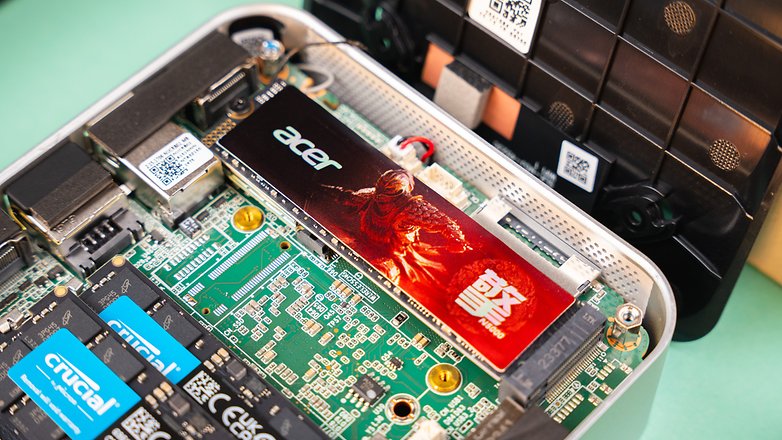
Let’s scroll up a little further and note that the Geekom A7 (based on the MSRP) is currently $450 cheaper than the basic Mac Mini with M2 Pro. If we were to upgrade this to include 32 GB RAM and 2 TB storage, the price difference would cross the $1,700 mark. Even if you are looking for an affordable Mac alternative with Windows 11, the Geekom A7 is really the best choice right now.
However, compared to Apple and even the Intel-powered models from Geekom, the A7’s SSD performed slower. However, I must point out that the Mac Mini does not support the AS SSD software and Windows does not support the Blackmagic SSD benchmark. The result comparison is therefore not 100% accurate.
Overall, the performance of the Geekom A7 is excellent compared to both Apple’s current batch of SoCs and previous Geekom models. It is particularly interesting to see Geekom’s new “GEEKOOL 4.0” cooling system ensure a consistently quiet noise level. Although the fan ran continuously during operation, the noise was not intrusive even in quiet environments. I also did not notice any problems with overheating in the review.
Power supply
Geekom changed the manufacturer of the power supply unit for the A7. Instead of MOSO, we now use a 120 W power supply from FSP. This is significantly smaller, and the manufacturer is no stranger to the power supply world. Once again, operation via USB-C Power Delivery is not possible, but the Geekom A7 proved to be quite economical in the review.
Pros:
- Low power consumption even under high load.
Cons:
With such a high level of performance, the question arose as to whether the notebook architecture also delivered low power consumption. If you regularly read my Mini PC reviews, you may remember the Geekom Mini Air 12 (review), which only consumed between 6 and 16 W when in use.
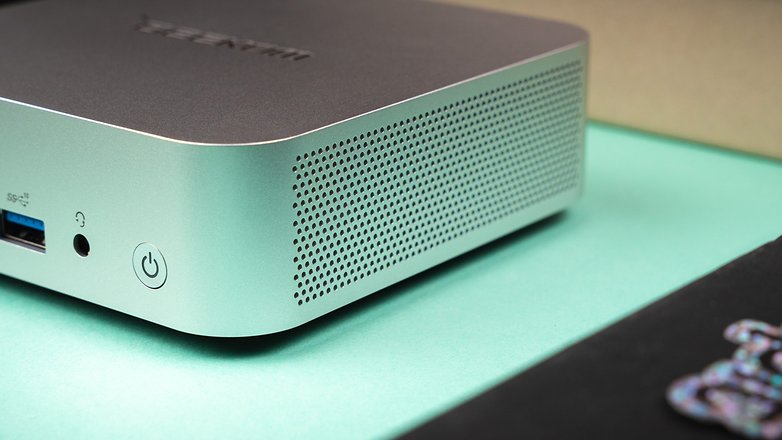
The power consumption of the A7 is definitely higher, but remains relatively low at approximately 17 W under normal operation and around 70 W at maximum performance. Once again in a comparison: Apple specified the power consumption of the Mac Mini with M2 Pro with values between 7W and 100W. While we do not have any concrete values here, they are not too different. In reality, this means they might be on par.
If you were to use the A7 as an office computer and work full-time, the annual cost would be approximately $14.55 annually, if we assume an electricity price of $0.16 per kWh. I have averaged the power consumption to assume mixed operation between idle and performance and based it on current electricity prices in February 2024. If we were to assume a consumption of 150 W for an office desktop computer, the costs rise to $50.15. If you want to save on your electricity bill, a Mini PC might be something you want to consider.
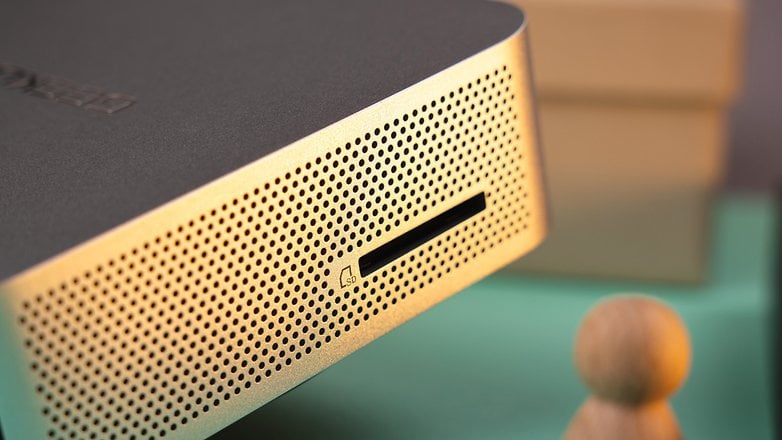
What still bothered me about the A7 is that it cannot be powered via USB-C Power Delivery. This would save both a power cable and a power socket. Even more so when the A7 was assembled as an all-in-one PC, making it very practical. However, the fact that Geekom has switched manufacturers to FSP for the power supply unit which uses a much more compact power supply unit is a very positive development.
Conclusion
With the A7 which was unveiled at CES 2024, Geekom is making a really strong start to the new year. While the manufacturer’s mini PCs were previously designed to deliver functionality, the A7 is a truly beautiful and high-quality product. It can even compete with Apple’s current Mac Mini with M2 Pro chipset in terms of performance and aesthetics with its magnesium chassis.
The powerful components, comprising an AMD Ryzen 9 SoC with the most powerful integrated GPU on the market, DDR5 RAM, and a fast M2 SSD, were more than convincing in practical use. There was virtually zero loading time when using it for office tasks, and the performance was even sufficient for current computer games on low graphics settings.
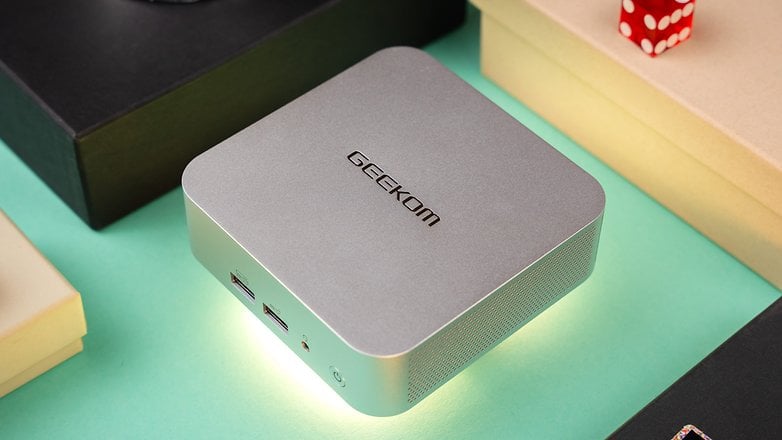
Thanks to the upgradeable RAM and the option of connecting an external GPU, the performance is certainly scalable. The fact that the A7 does not support Power Delivery via USB is a little annoying, though. Some eGPU cases would certainly support this, and it would have made it a little more practical to use.
The disadvantages of the Geekom A7 include HDMI 2.0 instead of 2.1 connectivity and a noticeable fan noise. At the same time, Geekom limited the performance of the SoC a little to reduce heat development. A slightly larger chassis might have done the mini PC some good.
In my opinion, however, these drawbacks are quite manageable when we remember that the A7 costs less than $850 even in its maximum configuration. With a price advantage of $1,700 for the same memory configuration, the Geekom A7 is more powerful, more compact, and significantly more repairable than the Apple Mac Mini with M2 Pro. As a result, I am happy to give full marks to the Geekom A7 in our nextpit review!

